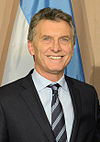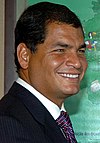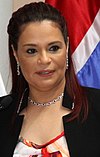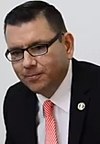Mariranan presidential election, 2012-13: Difference between revisions
old>Xiaodong |
m (1 revision imported) |
(No difference)
| |
Revision as of 16:22, 11 March 2019
| |||||||||||||||||||
| |||||||||||||||||||
File:2013 Marirana election map.png | |||||||||||||||||||
| |||||||||||||||||||
Marirana held its 50th presidential election in two rounds - the first on the 30th December 2012 and the second on the 14th January 2013 - to elect the 45th President of Marirana. As the first round did not see any candidate receive 50%+ of the vote, the two most voted candidates - Giorgio Macciocchi of the Coalition for Democratic Action and Lorenzo Occhetto of the Democratic Coalition of Socialists - entered a second round. Macciocchi ultimately won with 52.34% against Occhetto's 44.14%.
The election was held in the wake of the unpopular presidency of Dario Lorenzin and record high crime rates. Despite strong economic growth Occhetto was able to tap into popular discontent with the political establishment getting 38.02% of the vote in the first round compared to Macciocchi's 34.73%. Macciocchi however was able to win moderate voters in the second round enabling his victory in the polls. Macciocchi's victory brought back the presidency to the CPLD after a decade outside presidential politics.
Electoral process
Since the 1994 presidential election presidents in Mariranan are elected in a two-round system in which if a candidate does not achieve 50%+ of the vote in the first round the candidates with the two highest percentage of the vote will enter a second round. President's can serve a maximum of a single five year term whilst acting presidents can not run for re-election, meaning incumbent president Dario Lorenzin was not eligible to run re-election. Voting in Marirana is compulsory for all literate people's aged 18-75 with strict penalties for those who do not - however the existence of cartel groups in large swathes of the country typically results in turnout to be closer to 80%.
To registrar to become a candidate one has to be a Mariranan citizen, have had permanent residency in Marirana in the past five years, be over the age of 45 and either has collected 50,000 voters' signatures or be the official candidate of a political party with 3% representation in either the House of Senators or House of Councillors. People with dual citizenship are banned from running for public office.
Background

Since the return of democracy in 1987 Mariranan politics has been dominated by the centrist Coalition for Democratic Action, which held three successive presidencies (Stefano Uccello, Oliviero Michelozzi and Giordano Falcomatà) from 1998-2003. In 2003 a right-wing candidate Alfonso Hatoyama won the presidency, and five years later the presidency was won by Dario Lorenzin, who had assembled his own coalition of centrist forces to contest the presidency outside the more established CPLD, Democratic Left Alliance and Convergence for Freedom.
Lorenzin's coalition, the Alliance for the Centre, won a majority in the House of Councillors but was unstable, being composed of a mix of centre-left (Socialist Party, Union of Green Democrats - Ecological Action) centrist (Positive Marirana) and centre-right (Forza Marirana) parties. Eventually in 2010 Forza Marirana left the governing coalition and joined the CPLD, giving that coalition a majority in parliament and allowing FM leader Giovan Boutros to become prime minister. This placed Lorenzin in a state of cohabitation.
Following the ousting of the Alliance government the socialist party announced it would also leave Lorenzin's movement, instead allying with the Democratic Left Alliance. In 2010 the alliance rebooted itself as the Democratic Coalition of Socialists supporting a range of left-wing and populist policies. In 2012 the Convergence parties of the Pole of Good Government and the Party of National Reconstruction agreed to undertake a long awaited merger into the United National Party which aimed to unite the right of Mariranan politics. Members of the PRN who opposed the move soon formed their own, far-right party, the Traditionalist Alliance.
The state of cohabitation led to record disunity between the presidency and the government, with clashes over domestic policy (constitutionally the remit of the government) and foreign policy (constitutionally the remit of the president) becoming frequent. Lorenzin condemned the cohabitation as leading to a "system of paralysis" especially after talks with insurgent groups - supported by the president but opposed by the government - broke down in late 2011 after the government vetoed a proposal by Lorenzin to establish a demilitarised zone the size of Hennehouwe.
The state of cohabitation alongside differing policy priorities led to the Mariranan insurgency to steadily worsen during Lorenzin's presidency, despite economic growth being generally quite strong. When Lorenzin's term expired in 2013 Marirana had the highest homicide rate in the world with 78.64 murders per 100,000 people.
Candidates
| Candidate name and age political party |
Slogan | Political office(s) | Details | ||
|---|---|---|---|---|---|
| Giorgio Macciocchi (48) Anti-Revolutionary Party (Coalition for Democratic Action) |

|
Noi siamo la Soluzione We are the Solution |
CEO of Ferrano di Gruppo (1992-2012) |
Despite having never served in a political role before Macciocchi was nominated by the CPLD on the basis that he was a fresh face for the party who promoted pro-business policies. Macciocchi stuck by a largely neoconservative programme championing economic liberalism and a hawkish security policy. | |
| Lorenzo Occhetto (47) Communist Party of Marirana (Democratic Coalition of Socialists) |

|
Democrazia, Socialismo, Giustizia Democracy, Socialism, Justice |
Senator for Mederio (2008-2012) |
The first candidate nominated from the communist party since the 1950's, Occhetto led a largely left-wing populist campaign against corruption, high crime and inequality calling for the stripping of immunity from public officials and massive social investment to alleviate poverty. | |
| Isabella Profumo (55) United National Party (Convergence for Freedom) |

|
Ama la patria Love the homeland |
Senator for Ritaldi (2008-2012) |
The wife of former prime minister Eduardo Profumo, Isabella ran on a platform of tough security policies (including further militarisation of the police) as well as opposing socially liberal policies, vowing to "halt the promotion of anti-family lifestyles" and to rescind the 2009 divorce law which legalised the practice in Marirana. | |
| Matteo Barbarigo (54) Independent (Alliance for the Centre) |

|
Continua il Cambiamento Continue the Change |
Minister of Finance and Public Credit (2008-2010) |
An academic who previously served as Finance Minister in the cabinet of Maddalena Angiolillo, Barbarigo ran on a platform of continuing the core policies of the Lorenzin administration emphasising his clean public record and the need to fight corruption and pursue economic reform. | |
| Ettore Zanetti (45) Liberty and Justice Party |

|
Combattere per la nazione Fighting for the nation |
Councillor for Ritaldi (2002-2012) |
The leader of the breakaway faction of the former Party of National Reconstruction following its merger into the United National Party, Zanetti led a largely far-right, ultranationalist platform. He was the only candidate who filed his candidacy on the basis of receiving 50,000 signatures. | |

